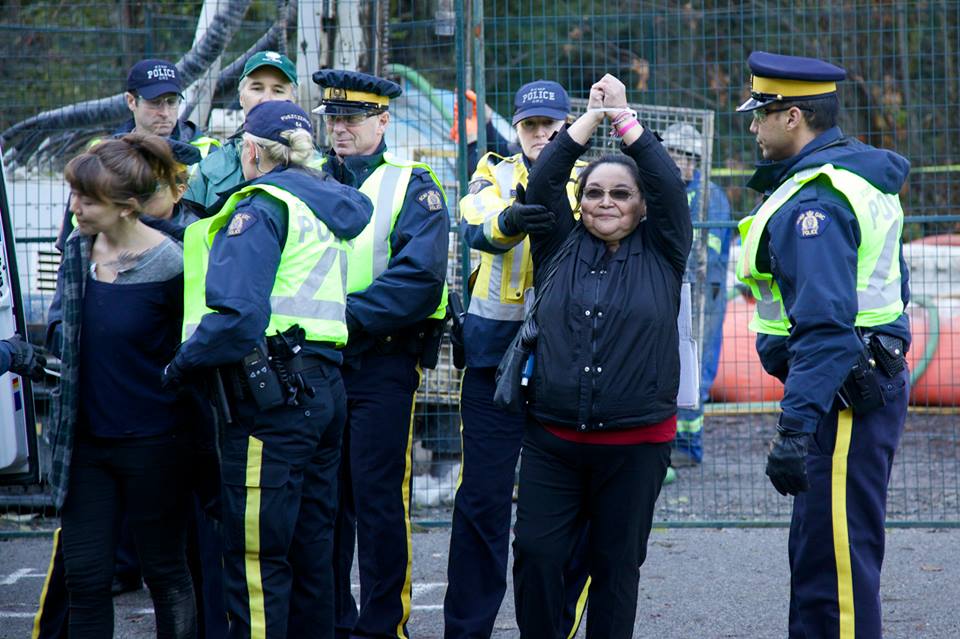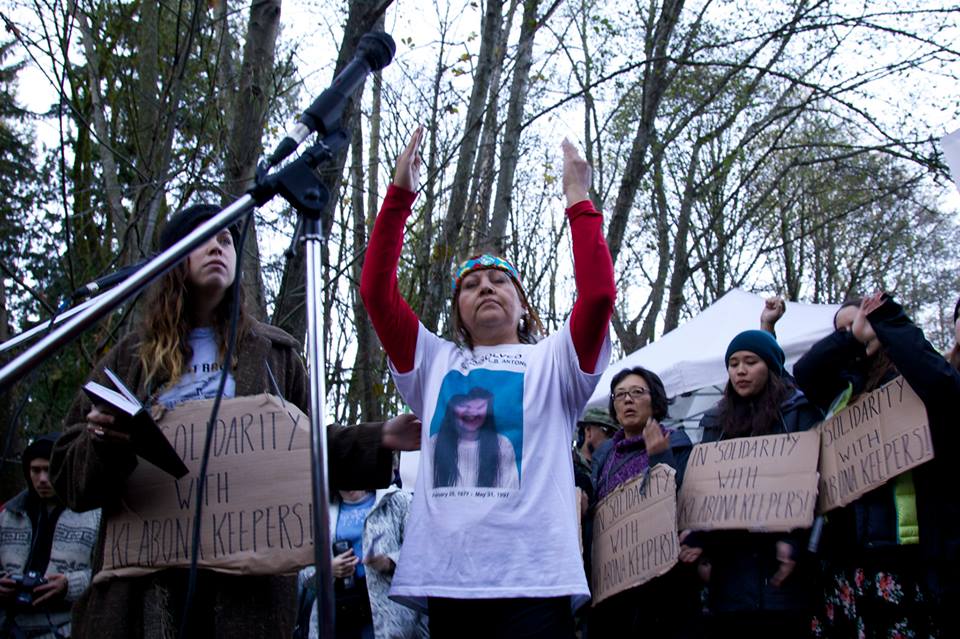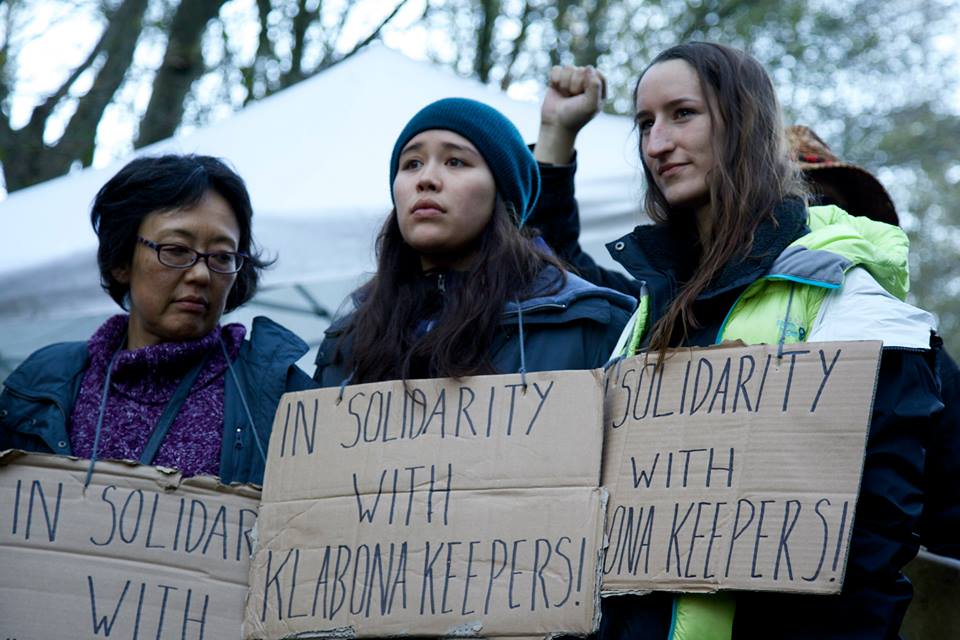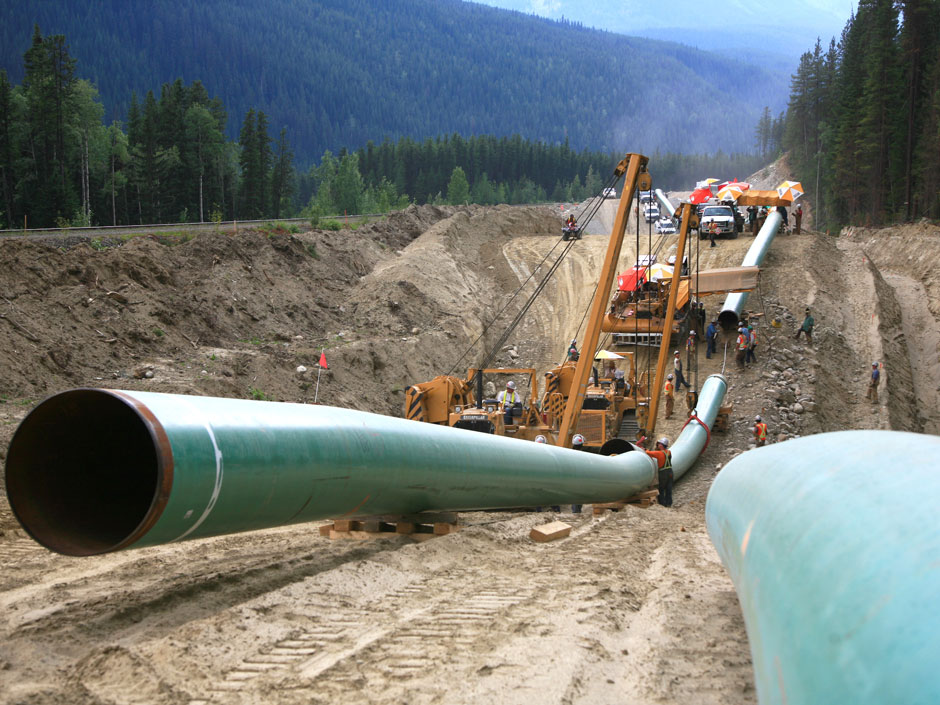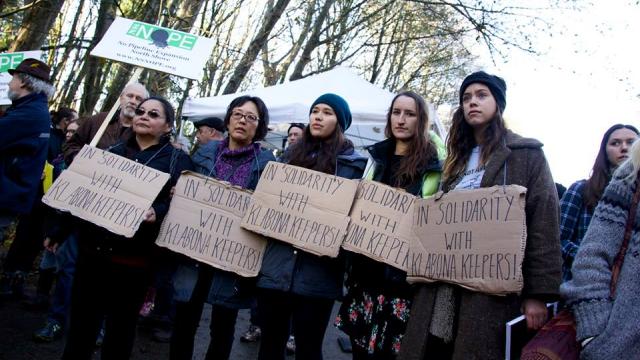
For years, residents and neighbors of the British Columbia city of Burnaby have been ringing alarm bells about Kinder Morgan’s intention to put a multi-billion dollar pipeline project through the region. Local First Nations and many city councils were vocally opposed to the pipelines and the associated infrastructure of terminals and tankers.
As surveyors for Kinder Morgan have been researching the proposed pipeline area around Burnaby Mountain by drilling boreholes, volunteer caretakers have maintained an active presence on the mountain since September. But it was a $5.6 million lawsuit from Kinder Morgan, filed on Oct. 30 against five named defendants, that sparked a massive community response resulting in over 100 arrests of Indigenous elders, community members and youth.
Kinder Morgan’s Trans Mountain pipeline is over 60 years old, and currently transports 300,000 barrels of diluted bitumen per day from the Alberta Tar Sands to the Burrard Inlet, at the base of Burnaby Mountain. The company is looking to “twin” the pipeline.
More accurately, it wants to lay down new, larger pipe alongside the current pipe, almost tripling the capacity of the current system to 890,000 barrels per day. It would increase the number of tankers traveling though the inlet from approximately one per week to one per day, and require the construction of an additional terminal at the base of the mountain.
Some of these tankers will likely be Super Tankers, with up to 10 times the capacity of the boats that currently navigate the Inlet, requiring parts of the Inlet to be dredged and greatly increasing the chances of a spill.
But suddenly there was a more immediate issue than the proposed pipeline. An injunction was filed against five known activists, plus “John Doe, Jane Doe, and persons unknown,” which would effectively bar anyone from accessing the conservation area on Burnaby Mountain, currently open to the public. British Columbia is no stranger to these types of lawsuits, commonly known as SLAPP (Strategic Litigation Against Public Participation), or injunctions.
In fact, it is routine practice for a company to apply for an injunction to prevent people from interfering with a company’s activities. These injunctions are often so promptly granted that it came as a shock to many when the judge gave the defendants time to seek counsel and seemingly considered their case for a little over a week before the verdict.
This window gave some people a glimmer of hope that the injunction wouldn’t be granted, that caretakers would be able to stay and protect the mountain, and that the community could continue to demonstrate as needed to ensure that no drilling happened.
Others, however, remained skeptical that the injunction wouldn’t be granted, and used the extra time to prepare for the worst-case scenario. People organized blockade trainings, de-escalation trainings, legal briefings and media and direct-action trainings on the mountain. The events brought people to the mountain; as the days went on, people got to know each other and became accustomed to the familial environment of the encampments. More began finding innovative ways to help.
Local members of the Squamish First Nation began a sacred fire at the main encampment, while other members of the Nation began carving a totem pole nearby. The fire was constantly fed by fresh donations of firewood, and many local Indigenous peoples brought their drums and led songs and prayers. More people outside the circle of caretakers and close supporters began to learn that Burnaby Mountain was unceded and un-Treatied lands, and began asking how Kinder Morgan could drill in Coast Salish Territories when none of the three local First Nations (Musqueum, Sḵwx̱wú7mesh, and Tsleil-Waututh) had consented.
The obvious answer is that our colonial legislative system favors corporate interests and large energy projects over Indigenous sovereignty. Urgency grew to maintain a constant presence to protect the mountain.
After a week and half of organizing and awaiting the verdict on Kinder Morgan’s application, the injunction was granted on Friday, Nov. 14, and made enforceable the following Monday. A rally at one borehole site and a tree-sit at another were organized to coincide with the injunction, within the no-go zone. But Kinder Morgan was nowhere to be seen.
For the next few days, police were legally able to enforce the injunction — yet all remained calm on the mountain as the tree-sit stayed in place and local residents took shifts to come to the mountain. A few Royal Canadian Mounted Police were consistently present, but their relationship with protesters remained largely benign as the encampments operated as usual.
With the help of many supporters, a consistent presence on the mountain remained. People came to help keep the encampments tidy, donate food, coordinate the kitchen, offer materials and warm clothing, and bring wood to maintain the sacred fire. Protecting the mountain became a sustained community effort. The energy and numbers were not dwindling as Kinder Morgan may have hoped.
It wasn't until Thursday, Nov. 21, at 8:30am, that police showed up in larger numbers at the main encampment where people were gathered around the fire. Shortly after their arrival, they made 13 arrests; throughout the day there were 24 arrests, including a member of the Squamish First Nation who had been keeping the sacred fire, one of the named defendants, and the individual who had spent several days in the tree-sit. Most were charged with civil contempt of court and released that day, so long as they agreed not to return to the injunction zone, and to appear in court in January. As a result, many returned to the mountain but remained out of the police's demarcated “no-go” zone. Thousands of people continued to organize events, rallies, and court and jail solidarity.
At times protesters were able to stop Kinder Morgan trucks from accessing the boreholes. At the very least, they slowed drilling and operations enough to force the company to request an extension to their injunction, which ended Dec. 1. The judge rejected Kinder Morgan’s application for the extension on the grounds that the National Energy Board had required all of the company’s testing to be complete by Dec. 1. (If the judge were to allow for the injunction to extend past that date, Kinder Morgan would first require the National Energy Board’s permission to drill on the mountain.)
Additionally, the application for extension revealed GPS errors for the “no-go” zone, resulting in most of the charges from the past week being thrown out. As a result, Burnaby Mountain saw its first victory in the courts, with Kinder Morgan forced to pack up and leave early, and over 100 charges dropped.
Although Kinder Morgan has left unceded Coast Salish Territories for the time being, many expect the company will be back. Organizers continue to keep watch over the mountain. The City of Burnaby and the Tseil-Waututh First Nation are engaged in an ongoing legal effort to keep Kinder Morgan out of the region. There are many tactics in use to stop the company from expanding its project. As Kinder Morgan is currently off-site, residents feel the flames may be dying down on Burnaby Mountain.
But if Kinder Morgan comes back for more testing, or eventually to lay down pipe, what happened last month could prove only to be the first spark of resistance.
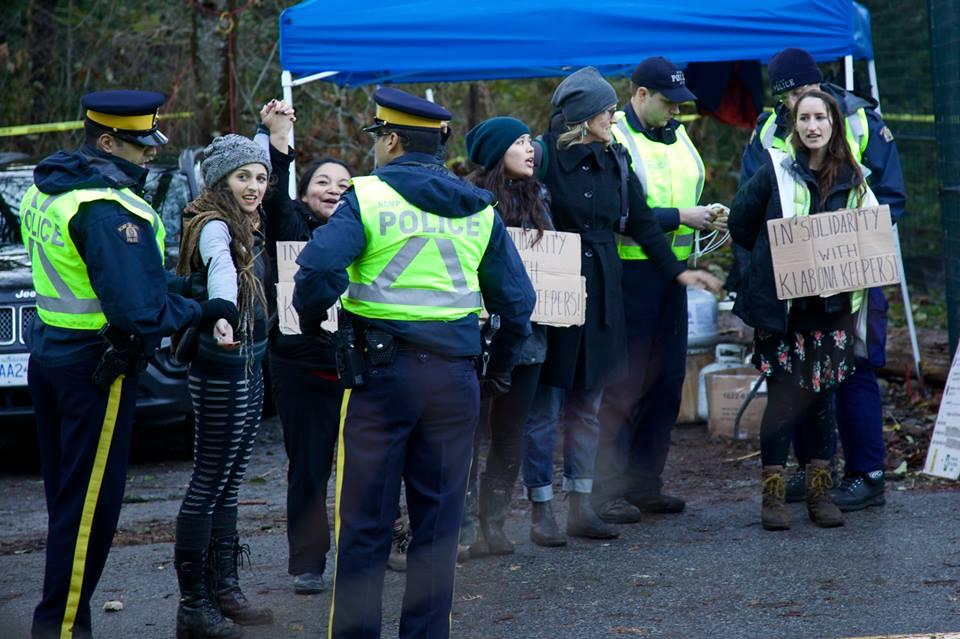
3 WAYS TO SHOW YOUR SUPPORT
- Log in to post comments

